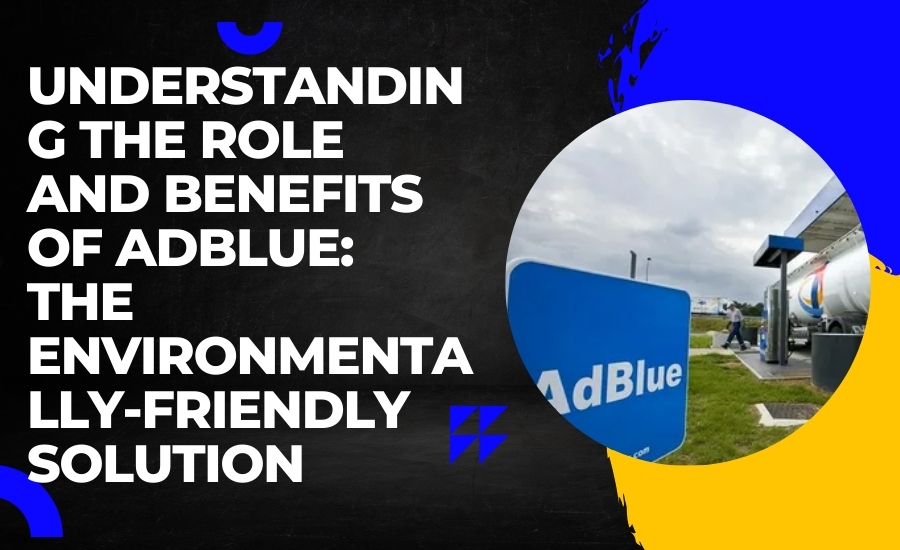In today’s world, as concerns about environmental sustainability grow, finding eco-friendly solutions for various industries is paramount. One such innovation is Adblue, a substance that plays a significant role in reducing harmful emissions from diesel engines. In this article, we’ll explore the fundamentals of Adblue, its benefits, and its role as an Adblue manufacturer.
What Is Adblue?
Adblue, also known as Diesel Exhaust Fluid (DEF), is a colorless, non-toxic, and odorless solution primarily composed of purified water and urea. It is used in Selective Catalytic Reduction (SCR) systems, which are integrated into diesel-powered vehicles and equipment to reduce nitrogen oxide (NOx) emissions.
How Adblue Works
Adblue’s primary function is to break down harmful nitrogen oxide emissions into harmless nitrogen and water vapor. This process occurs within the SCR system, which uses a catalyst to facilitate the chemical reaction. By doing so, Adblue helps diesel engines meet strict emission standards, making them more environmentally friendly.
The Benefits of Adblue
Using Adblue offers a range of benefits that contribute to a cleaner environment and improved engine performance.
1. Emission Reduction
Adblue is a key player in reducing harmful emissions, particularly nitrogen oxides (NOx). By converting NOx into harmless substances, it significantly lowers the environmental impact of diesel engines, helping combat air pollution.
2. Compliance with Regulations
Many regions have implemented stringent emission regulations for diesel-powered vehicles. Adblue enables vehicles to meet these standards, ensuring compliance with local and national regulations.
3. Improved Fuel Efficiency
While Adblue itself does not improve fuel efficiency, it indirectly contributes to it. Cleaner engines tend to run more efficiently, which can lead to reduced fuel consumption and cost savings.
4. Prolonged Engine Life
Reducing harmful emissions means less wear and tear on the engine components, potentially extending the lifespan of diesel engines and reducing maintenance costs.
The Role of an Adblue Manufacturer
Adblue Manufacturer play a vital role in the production and distribution of Adblue. They are responsible for ensuring the quality and availability of this essential fluid for consumers and businesses.
1. Production
Adblue manufacturers produce this fluid by carefully blending high-purity urea with deionized water. The resulting solution must meet strict quality standards to ensure optimal performance and emissions reduction.
2. Packaging and Distribution
After production, Adblue is packaged in various container sizes to accommodate different consumers, from individual car owners to large-scale industrial users. Manufacturers also ensure efficient distribution networks to make Adblue readily available to those who need it.
3. Quality Assurance
Maintaining the quality of Adblue is crucial. Manufacturers employ rigorous quality control processes to monitor the purity of the solution, ensuring it meets the required specifications. This guarantees that Adblue performs effectively in SCR systems.
4. Research and Development
Adblue manufacturers invest in research and development to improve the efficiency and eco-friendliness of their products. This includes developing new formulations and packaging options to meet the evolving needs of consumers and industries.
Adblue Usage and Storage
Using Adblue is a straightforward process, but proper handling and storage are essential to maintain its effectiveness.
1. How to Add Adblue
Adding Adblue to your vehicle is simple. Most diesel vehicles equipped with SCR systems have a dedicated Adblue tank. You can easily refill it at specialized Adblue filling stations or purchase containers of Adblue for manual refilling.
2. Storage Recommendations
If you need to store Adblue, it’s important to keep a few key considerations in mind:
a. Temperature: Adblue should be stored between 12°F (-11°C) and 86°F (30°C) to maintain its quality. Extreme temperatures can affect its effectiveness.
b. Container Material: Adblue should be stored in containers made of materials resistant to corrosion, such as high-density polyethylene (HDPE) or stainless steel.
c. Contamination Prevention: Avoid contaminating Adblue with substances like dust, dirt, or other liquids, as this can compromise its quality.
d. Shelf Life: Adblue has a shelf life of approximately one year if stored under proper conditions. Be mindful of the expiration date when purchasing.
Adblue Myths and Misconceptions
Like any product, Adblue has its fair share of myths and misconceptions. Let’s debunk some of the common ones:
1. Adblue Is Harmful to the Environment
This is a misconception. Adblue is an environmentally friendly product that aids in reducing harmful emissions. Its primary components are water and urea, both of which are non-toxic and safe for the environment.
2. Adblue Is the Same as Diesel Fuel
Adblue and diesel fuel are entirely different substances with distinct purposes. Diesel fuel powers the vehicle, while Adblue is used in the SCR system to reduce emissions. Mixing them up can damage the engine.
3. Adblue Is Expensive
While the cost of Adblue can vary depending on location and container size, it is generally affordable, especially when considering the environmental benefits and potential fuel savings.
Adblue in Various Industries
Adblue is not limited to just passenger vehicles. Its applications extend to various industries, where reducing emissions is a priority.
1. Transportation and Logistics
Trucks, buses, and commercial vehicles rely on Adblue to meet emission standards. The transportation industry benefits from Adblue by reducing its environmental impact.
2. Agriculture
Farm equipment, such as tractors and harvesters, often use diesel engines. Adblue helps farmers comply with emission regulations while maintaining the efficiency of their machinery.
3. Construction
Construction equipment, including bulldozers and excavators, can also benefit from Adblue, as it helps reduce emissions on job sites, which is crucial in urban areas.
4. Maritime
Adblue is even used in maritime transport, where ships equipped with SCR systems reduce NOx emissions to meet stringent regulations in ports and coastal areas.
Also read :- 5 Key Benefits of Using AdBlue in Riyadh’s Vehicle Fleet
Conclusion
Adblue, the eco-friendly solution for reducing emissions from diesel engines, plays a vital role in promoting environmental sustainability. It benefits not only individual vehicle owners but also various industries seeking to reduce their carbon footprint. As an essential product, Adblue manufacturer play a significant role in ensuring its quality and availability, making it accessible to all who want to contribute to a cleaner and greener future. By understanding the fundamentals of Adblue and its positive impact, we can make informed choices that benefit both our vehicles and the planet.




